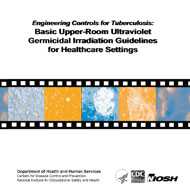Environmental Control for Tuberculosis: Basic Upper-Room Ultraviolet Germicidal Irradiation Guidelines for Healthcare Settings
March 2009
DHHS (NIOSH) Publication Number 2009-105

Research indicates that an appropriately designed and maintained upper-room UVGI system may kill or inactivate airborne TB bacteria and increase the protection afforded to healthcare workers while maintaining a safe level of UVGI in the occupied lower portion of the room. The purpose of this document is to examine the different parameters necessary for an effective upper-room UVGI system and to provide guidelines to healthcare managers, facility designers, engineers, and industrial hygienists on the parameters necessary to install and maintain an effective upper-room UVGI system. These guidelines are consistent with previous CDC healthcare guidelines and expand upon them. This document provides an overview of the current knowledge concerning upper-room UVGI systems and research needs. Information from CDC/NIOSH-funded laboratory studies and other relevant studies is combined in this report to provide guidelines for the installation and use of upper-room UVGI systems. Although other pathogenic microorganisms may be killed or inactivated by upper-room UVGI systems, the guidelines were developed for the installation and use of upper-room UVGI systems capable of killing or inactivating surrogates of mycobacteria.
Environmental Control for Tuberculosis: Basic Upper-Room Ultraviolet Germicidal Irradiation Guidelines for Healthcare Settings [PDF - 6,925 KB]
Document Development History
- Page last reviewed: June 6, 2014
- Page last updated: January 4, 2017
- Content source:
- National Institute for Occupational Safety and Health Education and Information Division


 ShareCompartir
ShareCompartir